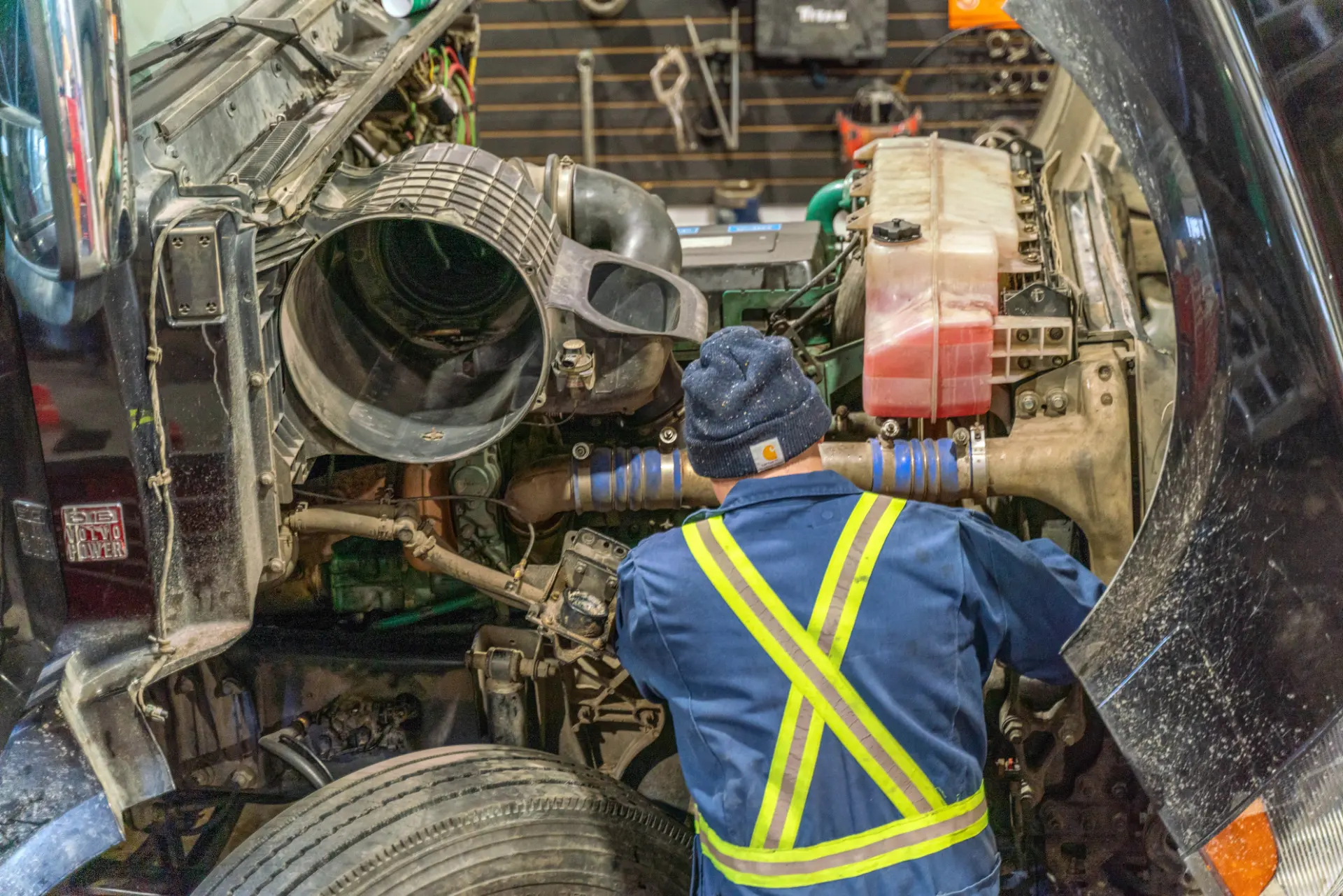Overlooking Lubrication In Heavy Duty Trucks: Damage To Critical Components
Explore the critical significance of lubrication in heavy-duty trucks and the potential damage to crucial components due to inadequate maintenance. Learn about various lubricants, their functions, and the repercussions of neglecting proper lubrication.

Neglecting lubrication in heavy-duty trucks can lead to severe consequences for critical components. Heavy-duty trucks have demanding needs for proper lubrication as it keeps engines, transmissions, and differentials running smoothly. Without it, these components suffer increased wear leading to premature breakdowns and costly repairs. This oversight not only impacts vehicle performance but also jeopardizes safety and operational efficiency.
The Role of Lubrication in Heavy-Duty Trucks
Lubrication is vital for heavy-duty trucks, ensuring mechanical longevity and optimal performance. It reduces friction between moving parts, preventing wear, which is crucial for engines and drivetrains that operate under high stress. Proper lubrication also aids in heat dissipation, safeguarding components from the damaging effects of high temperatures. Lubricants prevent abrasive damage by trapping contaminants like dust and metal filings and maintain clean internal surfaces. Additionally, they form a barrier against moisture, protecting metal parts from rust and corrosion. Consistent lubrication with the correct products is therefore indispensable in the maintenance routine of heavy-duty trucks.
It’s a critical maintenance ritual that ensures the longevity and reliability of every truck in your fleet. Proper lubrication reduces friction between moving parts, keeping the truck's engine and other critical components running without a hitch.
Functions of Lubricants in Heavy-Duty Trucks
Lubricants in trucks serve vital functions like reducing friction or protecting against wear, that provide aid for engine and other components to keep these parts at peak performance.
Minimizing Friction: Lubricants create a thin film that prevents direct contact between moving parts. This film not only reduces wear on engine components but also results in smoother operations and conserves energy by reducing the load on the engine. The reduced friction also leads to lower maintenance costs and extends the lifespan of critical components. Furthermore, efficient lubrication contributes to better fuel economy by allowing the engine and drivetrain to work with less resistance.
Dissipating Heat: Lubricants in heavy-duty trucks serve an important role in heat management by carrying away heat from areas of friction and combustion. This heat dissipation helps prevent the engine and other critical systems from overheating, vital for maintaining performance during long hauls. Coolants specifically are designed with the idea to absorb heat from components like engines. Friction prevention stops heat creation from metal-on-metal action and maintains a stable temperature across all moving parts. It ensures consistent operational efficiency. Managing heat effectively increases reliability and prevents thermal degradation of both the lubricant and truck components.
Preventing Contamination: In harsh environments where heavy-duty trucks operate, lubricants play a key role in preventing contamination by suspending dirt and debris within the fluid. Contaminants are removed by the truck's filtration system, preventing the formation of deposits that can lead to engine damage. Lubricants also help seal against particulates by “dragging”, keeping the internal mechanisms clean. Regular oil changes are essential to remove these contaminants and keep the engine running smoothly.
Protecting Against Rust: Lubricants form a protective barrier over metal surfaces in heavy-duty trucks, shielding them from the moisture that can lead to rust and corrosion. This protective layer is particularly important in critical areas such as the engine and undercarriage, which are exposed to corrosive substances like road salt. By preventing rust, lubricants help maintain the structural integrity of truck components. Regular application and maintenance of lubricant layers ensure long-term protection from corrosion, even in the most challenging conditions.
Types of Lubricants Used in Heavy-Duty Trucks
Our arsenal of lubricants is carefully selected to cater to every truck's needs:
Engine Oils: Engine oils are specifically tailored to meet the rigorous demands of heavy-duty truck engines, providing a protective layer that reduces wear on moving parts. With high-temperature stability, they ensure the engine operates efficiently under varying load conditions. Advanced engine oils are designed to enhance fuel economy and reduce emissions, contributing to overall engine performance and longevity.
Transmission Fluids: Transmission fluids are essential for the smooth operation of a truck's gearbox, ensuring gears shift seamlessly without excessive wear. They are formulated to withstand the high pressures encountered in modern transmissions, providing a durable layer of lubrication between moving parts. These fluids also help to maintain the correct operating temperature and prevent the buildup of sludge and varnish.
Gear Oils: Gear oils are designed to cope with the stress and strain heavy-duty truck differentials endure, providing a thick, durable coating that cushions gears. They contain additives that combat the high-pressure conditions and shock loads that truck gears are subjected to. These oils are also resistant to high temperatures, helping to maintain viscosity and protect against wear.
Greases: Greases are used in heavy-duty trucks for components that require a long-lasting protective layer that won't flake away under extreme conditions. They are crucial for lubricating parts that are exposed to the elements, such as wheel bearings and chassis components. Greases also resist being washed away by water and protect against dust and dirt. By using the right type of grease, heavy-duty trucks can ensure that their components are protected from wear, pressure, and environmental damage.
Consequences of Inadequate Lubrication
Increased Friction and Wear: The friction enemy is ever-present, waiting for a drop in lubrication to pounce and wear down your components, leading to premature failures and costly downtimes.
Overheating Components: Lack of proper lubrication is like running a marathon in a fur coat – it leads to overheating. Every heavy-duty truck’s cooling system relies on lubrication to help maintain a safe operating temperature.
Shortened Life Span of Parts: When lubrication is compromised, the life expectancy of critical parts plummets. This isn't just about maintenance; it's about keeping your investment on the road longer.
Critical Truck Components Affected by Poor Lubrication
Proper lubrication is paramount for critical truck components, as its absence can lead to catastrophic failures. The engine depends on consistent lubrication to prevent damage. Vital parts such as camshafts and crankshafts rely on this to function effectively over long distances.
Similarly, the transmission's health is lubricant-dependent; without it, gears may grind, signaling the potential for extensive transmission damage that could necessitate a complete replacement.
The differential and gears, which endure significant pressure, require a lubricant to act as a buffer to prevent wear and avoid inevitable failure.
Even seemingly minor components like bearings and seals play a critical role in the truck's operation. They rely on lubrication to remain intact, fulfilling their purpose of maintaining the proper positioning and smooth operation of various parts.
Contact Us
At Fleetgo we understand the intricacies of truck maintenance. We’re not just here to fix problems; we're here to prevent them. Our team of seasoned technicians is equipped with the best lubricants and knowledge to ensure that every truck leaving our shop is fortified against the rigors of the road. Don’t wait for the warning signs. Contact us today to schedule a comprehensive lubrication service and keep your fleet in prime condition. Your trucks deserve the best, and so do you.
More Articles

Why Vibration at Highway Speed Often Points to Driveline Problems

Why Uneven Brake Wear Signals Bigger System Issues

Early Signs of Differential Failure in Heavy-Duty Trucks
Contact FleetGo
Get in touch with Fleetgo today to request a quote or to schedule in-shop or mobile services in Edmonton & the surrounding area! Our mobile service extends to a 100km radius around Edmonton for emergency roadside assistance & mobile truck & fleet repairs, including Sherwood Park, Spruce Grove, Fort Saskatchewan, St. Albert, Stony Plain, along Highway 16, & more!


